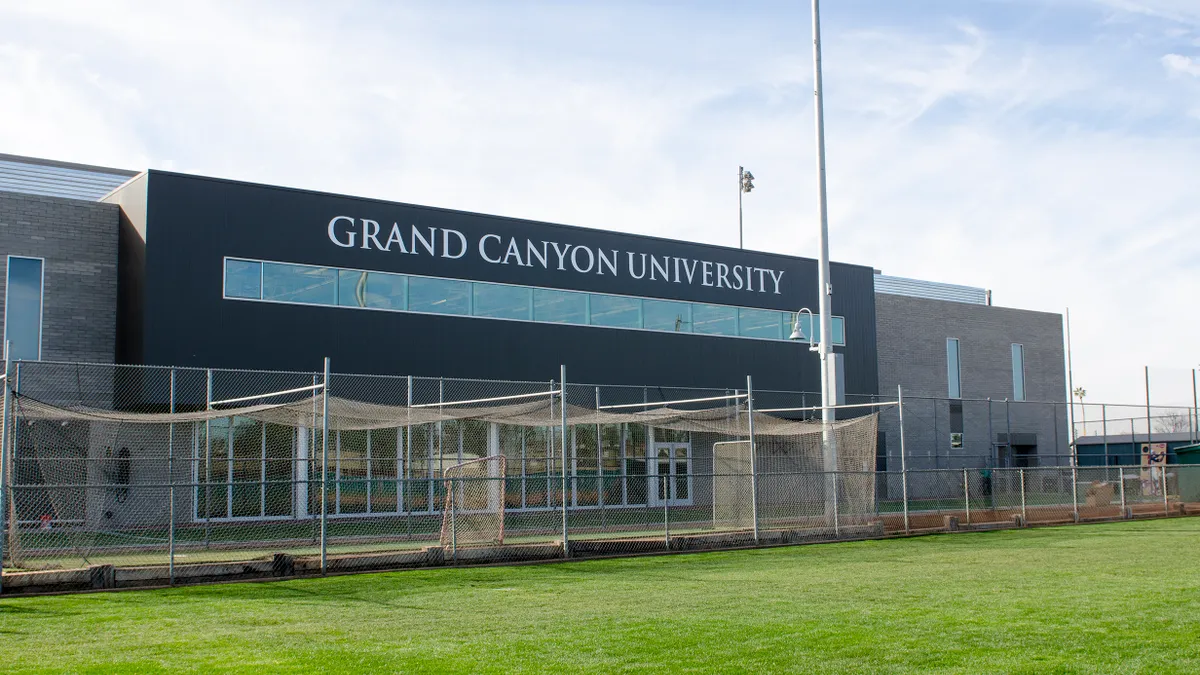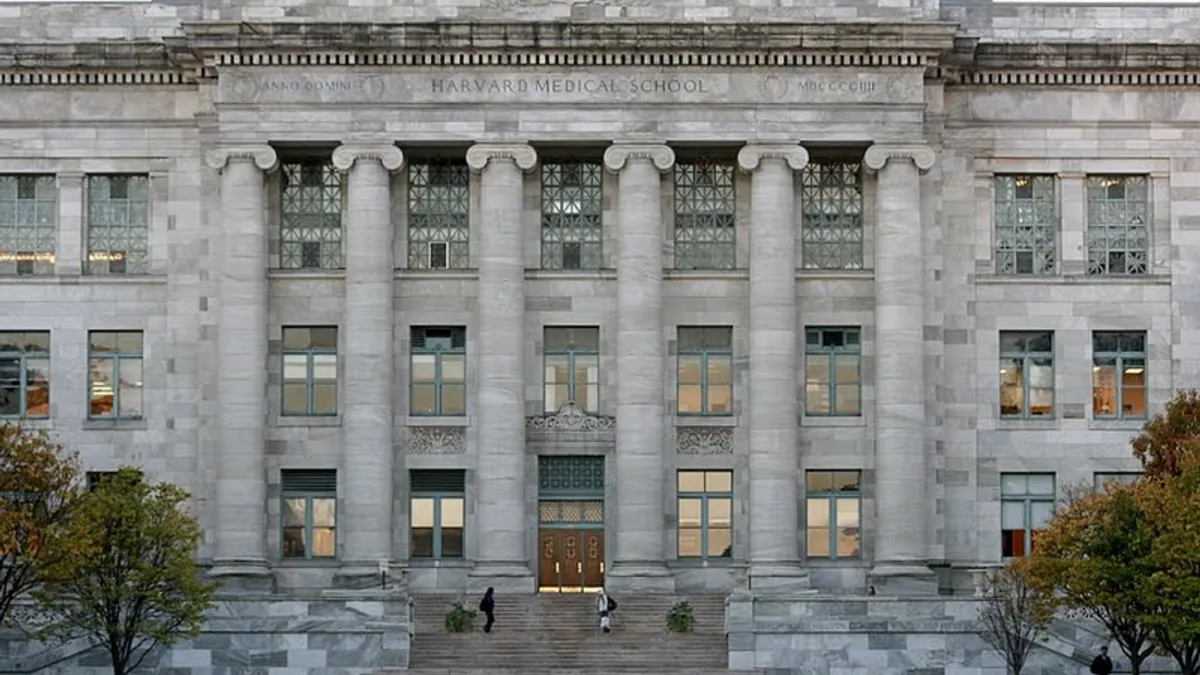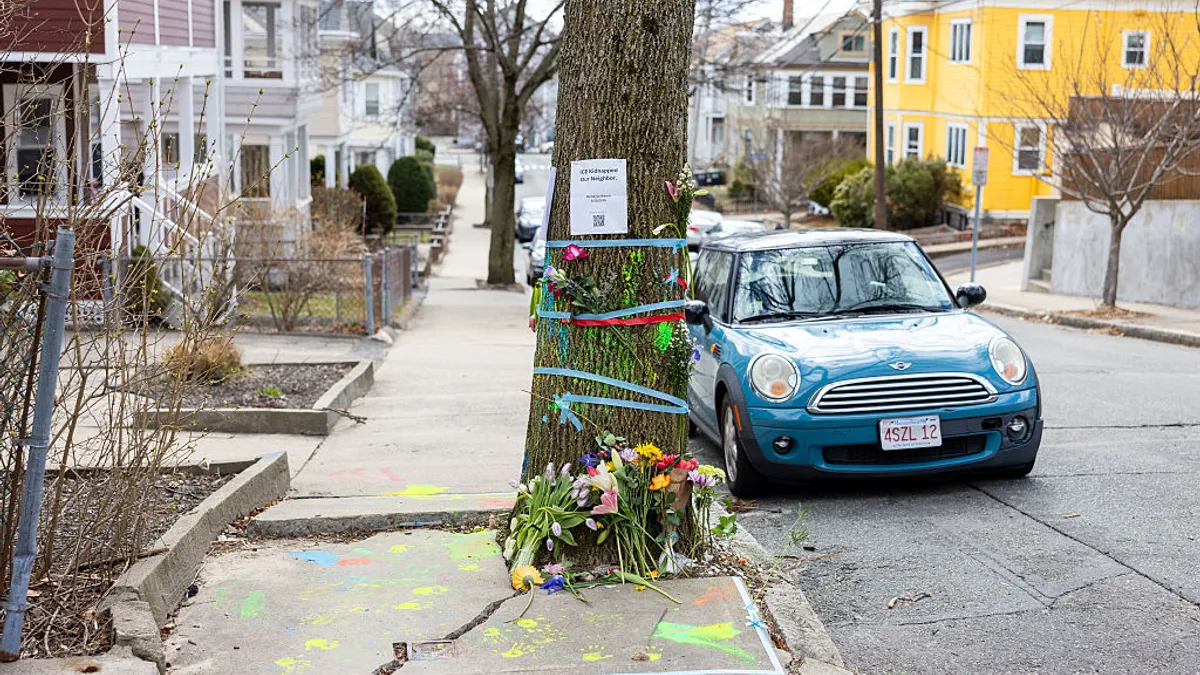The U.S. Department of Education announced Tuesday that it is fining Grand Canyon University $37.7 million, accusing the large Christian institution of lying to thousands of current and former students about the cost of its doctoral programs.
An investigation by the department’s Federal Student Aid office determined that Grand Canyon had falsely advertised the price of its doctoral programs to over 7,500 students since 2017. Although the university said the programs cost between $40,000 and $49,000, 98% of students ended up paying more, according to the Education Department.
Grand Canyon has 20 days to request a hearing or submit materials to the Federal Student Aid office explaining why it shouldn’t be fined. In a statement Tuesday, Grand Canyon said it “categorically denies” the Education Department’s allegations and “will take all measures” to defend itself against them.
The university, citing other investigations, cast the fine as “evidence of the coordinated and unjust actions the federal government is taking against the largest Christian university in the country.”
The Education Department’s action targets one of the most prominent universities in the U.S. Grand Canyon enrolls around 96,000 students and disbursed nearly $1.2 billion in Title IV federal financial aid during the 2020-21 academic year.
“We intend to send a message about schools that engage in misconduct and deceptive practices,” Richard Cordray, Federal Student Aid’s chief operating officer, said during a call with reporters Tuesday. “They will be held responsible for any malfeasance that violates the law and harms students.”
What happened?
The vast majority of Grand Canyon’s doctoral graduates needed to take classes called “continuation courses” to complete their dissertation requirements, adding extra costs to their programs, according to the Education Department.
More than three-quarters of doctoral student graduates, 78%, ended up paying $10,000 to $12,000 more than the advertised price to complete their programs.
In response to the department’s findings, Grand Canyon pointed to fine print disclosures in some of its enrollment agreements and other materials, the Education Department said. However, the agency rejected that defense.
“These disclosures are insufficient to cure the substantial misrepresentations regarding cost,” the Education Department said in the Tuesday announcement. “Furthermore, the disclosures are also buried in dense documents and are much less prominent than the misrepresentations.”
Last month, Federal Student Aid added new requirements to Grand Canyon’s provisional program participation agreement — a contract the university must follow to remain eligible for Title IV aid.
For one, Grand Canyon cannot misrepresent the cost of its doctoral programs and must tell students the average tuition and fees that graduates have paid. It must have a monitor oversee its compliance with this condition.
The university also must regularly inform the department about any government or accreditor investigations or legal proceedings. And it must notify all employees who recruit and serve doctoral students about how to use the Federal Student Aid office’s tip line to report misconduct, as well as tell currently enrolled doctoral students how to submit a complaint to the Education Department.
The agreement governs the university’s federal student aid participation for the next three years, the Education Department said.
What has GCU said?
The Education Department’s fine comes a few weeks after Grand Canyon released a lengthy public statement asserting it was being unfairly targeted by government agencies.
The nearly 5,000-word statement, released Oct. 5, referenced the Education Department’s allegations about the doctoral programs, as well as other government actions and investigations. It said the university “provides further transparency than is legally required,” including by providing students with a degree program calculator to help them estimate their program costs.
But the tool is simpler for bachelor’s and master’s students to use, the statement said. That’s because doctoral degrees don’t have a fixed cost due to dissertations.
Even if doctoral students have taken the required 60 credits, they may have to take continuation courses to finish their dissertations, according to the university.
“The time it takes to complete a dissertation is unique to each Doctoral candidate and there are many variables that affect the amount of continuation courses they may need to take,” the statement said. It further said Grand Canyon makes it clear that some students may need to take additional courses, creating varying costs for students.
In the same statement, Grand Canyon alleged that federal agencies were apparently retaliating against the university over its lawsuit against the Education Department.
In 2021, the university sued the Education Department over the agency's decision to consider it a for-profit college for the purposes of Title IV aid — subjecting Grand Canyon to stricter regulations.
A federal judge upheld that decision in late 2022. Grand Canyon has since appealed, and oral arguments in the case are scheduled for December.
The conflict between the Education Department and Grand Canyon over the university’s for-profit status stems from the university’s move in 2018 to split from its former owner, Grand Canyon Education, or GCE.
Although the university separated from GCE, it entered into a 15-year contract with the company to receive support services like marketing and recruitment. In return, the university pays GCE 60% of its tuition and fee revenue.
Grand Canyon sought to become a nonprofit as part of the transaction. Although the IRS greenlit the change in status, the Education Department said in 2019 it would continue treating Grand Canyon University as a for-profit institution.
In a letter explaining its decision, the Education Department said the university’s services contract with GCE was primarily intended to “drive shareholder value” for the education company.
In its Oct. 5 statement, Grand Canyon said the Federal Trade Commission is investigating its former owner. GCE believes the FTC investigation is focused on the calls it makes to prospective students on behalf of Grand Canyon, the university said.
An FTC spokesperson confirmed Tuesday there is an investigation but declined to comment further
In its Tuesday statement, Grand Canyon again referenced the FTC investigation, alleging that the university is being “unjustly targeted in an agenda-driven manner.”
And in its Oct. 5 statement, the university said GCE would contest any accusations of wrongdoing or civil penalties stemming from that inquiry.






















